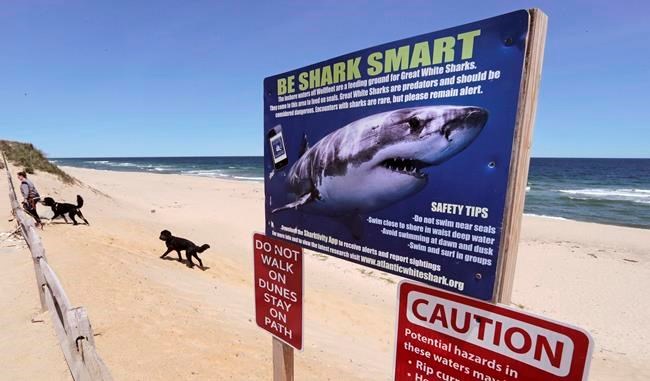FREDERICTON — An unusually high number of great white sharks found dead on Canadian beaches over the past year is a sign the population is growing, says a shark biologist.
Four great white sharks were found washed up along beaches in Prince Edward Island, Nova Scotia and New Brunswick in the past 12 months, said John Chisholm from the New England Aquarium, in Boston, Mass. That number is higher than previous years, he said in an interview Thursday.
"The other part of this is how many go unreported as well," he said.
Great white sharks have been protected in Canada since the late 2000s and the United States since the mid-1990s, Chisholm said, adding that those conservation efforts may be leading to a population growth.
"In addition to the sharks being protected, the food that they eat has also been protected — the seals especially,” he said. "It's a combination of factors that are contributing to increased numbers."
University of Prince Edward Island's Atlantic Veterinary College, in Charlottetown, reported that the carcass of a great white shark was found on a beach Aug. 7. The animal, which washed ashore on Greenwich National Park, measured almost 2.7 metres in length and weighed about 215 kilograms, pathologists at the college said.
"There were no signs of significant injuries, no signs of trauma and no evidence of fishing entanglement," Apryl Munro, spokeswoman for the veterinary college, said in an email. The shark’s carcass, she added, was "very fresh," allowing pathologists to determine that its liver was in good condition and that the animal was well fed. Samples were taken for research and to help determine the final cause of death.
Chisholm said scientists are unsure why sharks get stranded and are found dead on beaches. Sometimes, he said, sharks die from injuries sustained by entanglements in fishing equipment. Other times, he said, the animals get sick.
"We're not exactly sure if they just had bad luck and got caught in the shallows and got washed up on the beach and couldn't get back in the water," he said. "There's various reasons why they end up being stranded."
Tonya Wimmer, executive director of Marine Animal Response Society, said, "it is a bit concerning" that four great white sharks were found dead in 12 months. "The white sharks seem to be all over, frankly."
The dead shark near Parrsboro, N.S., was found washed up on June 24. It was in good condition but a necropsy was done on the animal, she said.
Fisheries and Oceans Canada scientist Heather Bowlby said great white sharks have always been present in Atlantic Canadian waters, with records going back to the early 1900s.
Chisholm said his great-great grandfather caught two great white sharks in a mackerel net while fishing in Georgetown, P.E.I., in September 1921. "So I've always known they've been there since I was a little kid."
In Canada there is abundant shark prey — striped bass, tuna, seals, and porpoise — but there may be other reasons people have reported a rise in shark sightings, Bowlby said.
"While there is anecdotal evidence that the white shark population is increasing, we are seeing more sharks tagged by researchers, and people are more present on the waters with access to personal phones and social media, allowing their encounters to be distributed more quickly and widely than before," she said.
Chisholm said another factor that could be leading to an increase in shark numbers in Canadian waters is the ocean temperature. They can tolerate a wide range of water temperatures but the temperatures here of around 15 C are particularly well-suited, he said.
A paper published in July in Marine Ecology Progress Series established a baseline of 800 great white sharks that visited Cape Cod, Mass., between 2015 and 2018.
Bowlby said previous research suggests about 20 per cent of those sharks come to Canada, which would represent 160 creatures. But she said it's "very difficult" to do a census for a species like the white shark, because they aren't regularly caught in fisheries.
A study published in June 2022 in the Canadian Journal of Fisheries and Aquatic Sciences said tagging and monitoring indicates that great white sharks are more abundant in Canadian waters than previously assumed from historical sightings and capture data.
Chisholm said that while the risk to humans from a shark attack is minimal, people should err on the side of caution and not treat the ocean as their private swimming pool.
“It's a wild place, just as wild as the Amazon, the Serengeti, in Africa — it's a wild place,” he said.
“We wouldn't go on a safari just wearing a pair of flip flops and a bathing suit. We don’t really treat the ocean with the same respect, but we should because it’s a wild place.”
This report by The Canadian Press was first published Aug. 10, 2023.
Hina Alam, The Canadian Press
Note to readers: This is a corrected story. A previous version said the bodies of great white sharks had washed up in Prince Edward Island, Nova Scotia, New Brunswick and Quebec. In fact, there have been no such incidents in Quebec.



